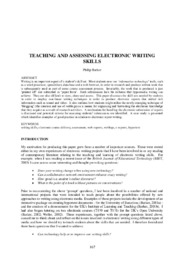Teaching and assessing electronic writing skills
Abstract
Writing is an important aspect of a student’s skill set. Most students now use ‘information technology’ tools, such as a word processor, spreadsheet, data base and a web browser, in order to research and produce written work that is subsequently used as part of some course assessment process. Invariably, the work that is produced is just ‘printed off’ and submitted in ‘paper form’. Such submissions lack the richness that hypermedia writing can achieve. They are also difficult to store, share and access. This paper discusses the skill sets needed by students in order to employ non-linear writing techniques in order to produce electronic reports that embed rich information such as sound and video. It also outlines how students might utilise the newly emerging technique of ‘blogging’ (the creation and use of weblogs) as a means for organising and harvesting the electronic knowledge that they acquire as a result of research activities. A mechanism for handling the electronic submission of reports is discussed and potential criteria for assessing students’ submissions are identified. A case study is presented which identifies examples of good practice in relation to electronic report writing.
